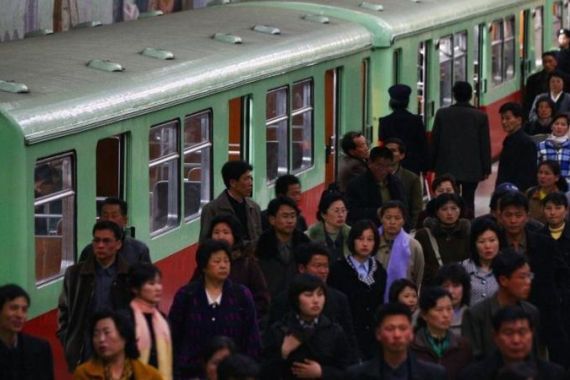US suspends food aid to North Korea
Official says Pyongyang has “broken its promise to refrain from missile launches and cannot be trusted”.

The US has suspended food aid to North Korea because Pyongyang has broken its promise to refrain from missile launches and cannot be trusted to deliver the aid to those who need it, a US defence department official has said.
A planned rocket launch next month by North Korea “reflects their lack of desire to follow through on their international commitments”, Peter Lavoy, acting assistant secretary of defence for Asian and Pacific affairs, told US legislators, on Wednesday.
Keep reading
list of 4 items‘Mama we’re dying’: Only able to hear her kids in Gaza in their final days
Europe pledges to boost aid to Sudan on unwelcome war anniversary
Birth, death, escape: Three women’s struggle through Sudan’s war
“So we’ve been forced to suspend our activities to provide nutritional assistance to North Korea,” he said before the House Armed Services Committee.
North Korean authorities say the planned launch, scheduled for between April 12 and 16, is to put a satellite in space for scientific purposes.
But Lavoy said that In light of North Korea’s actions, the US had “no confidence” that it was possible to “to ensure that the food assistance goes to the starving people and not the regime elite”.
Under a deal reached last month, North Korea had agreed to a partial nuclear freeze and a missile test moratorium in return for US food aid.
The US had previously warned that any launch would jeopardise food assistance, but the official’s comments at a congressional hearing marked a tougher stance and made clear plans to deliver aid had already been scrapped.
‘Nuclear blackmail’
Speaking to Al Jazeera, Joseph Cheng, a professor of political science at City University in Hong Kong said: “I think simply the regime doesn’t want to open its doors, doesn’t want to engage in democratisation, and at the moment is using nuclear blackmail to secure food aid, to secure various types of assistance, to prop up the regime.”
Cheng said the US was not ready nor willing to use military force, and the Obama administration was attempting to exert pressure by other means on Pyongyang.
“[The US] chooses to try to maintain some kind of a dialogue and to persuade [North Korea] to eventually follow the path of China and Vietnam to engage in economic reforms.”
Al Jazeera’s Rosiland Jordan, reporting from Washington, said: “It is significant because the US thought it was finally making some progress toward returning to the larger six-party talks dealing with nuclearisation of Korean peninsula, more particularly with ending North Korea’s ambitions to have nuclear weapons.”
“However, a senior administration official said that the hope is that they won’t be able to get back to trying to deliver some sort of emergency nutritional assistance to North Korean people but again the only way for that to even be considered, at least from a US perspective, is for North Korea to officially call off this launch,” she said.
A North Korean space technology official told the Korean Central News Agency that the satellite was intended to estimate crop production and analyse natural resources, orbiting the earth at an altitude of 500 kilometres.
The US and its regional allies say it would in fact be a long-range missile test banned under UN resolutions.
“This planned launch is highly provocative because it manifests North Korea’s desire to test and expand its long-range missile capability,” Lavoy said.
Victoria Nuland, the US State department’s spokesperson, also said it would be hard for the US to give food aid “without being sure that “commitments… would be honoured to ensure that the food gets to the right people”.